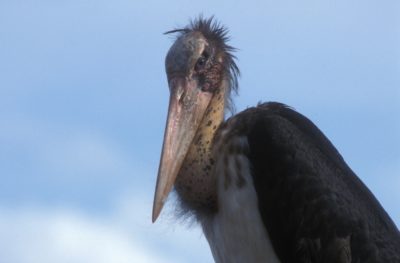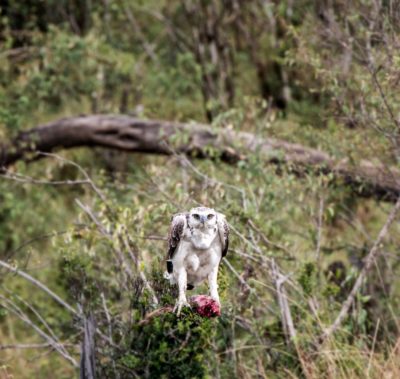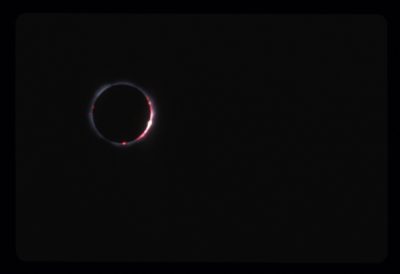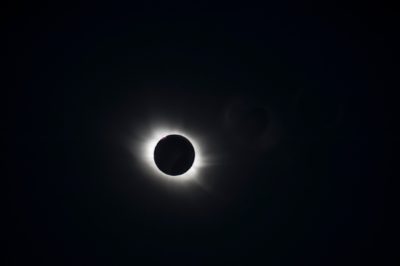by Bill Murray
 I’m scared of birds. They’re dinosaurs, you know. They descend from the Jurassic when, just like in Jesus Loves Me, ‘they were big and we were small.’ Did you see those huge dinosaur tracks they found in Texas last summer? You were a scurrying little proto-mammal, foraging and minding your own business in the underbrush when that thing came along and blotted out the sun.
I’m scared of birds. They’re dinosaurs, you know. They descend from the Jurassic when, just like in Jesus Loves Me, ‘they were big and we were small.’ Did you see those huge dinosaur tracks they found in Texas last summer? You were a scurrying little proto-mammal, foraging and minding your own business in the underbrush when that thing came along and blotted out the sun.
Birds are not cute little hopping around pixies, as likely shitting on your hand as sitting on it. Birds don’t have the presence of mind to fly off the hand that feeds it before despoiling it. Hummingbirds don’t even make sense in theory.
After the noise and furor that humans send up, birds are this world’s most insistent, annoying noisemakers, operating in the frequencies between bad manners and prison. The vocal rancor and pith of seagulls (find and bring to me a seagull that calms you) and the cage of two, three, four notes the rest of the bloody lot are doomed to stand inside and repeat all morning before it’s time to wake up, between those is where madness lies.
Privileged humans love birds. Birds’ appeal, they say, stacks right up alongside the majesty of the lion and the cheetah on safari. After you and your safari guide have rooted around for your fill of those mud trenches hippos make, say, and avoided the tse tse fly outbreak in day long pursuit of the famous muttering toad of this unique valley, somehow apparently, accidentally spying a dwarf cassowary in the sawgrass makes the day perfection.
Birds aren’t affable. Birds don’t giggle; birds accost. Find me a bird who sits outside your window as you wake and senses when to stop that almighty three note barrage that seems to be all he can muster. You will not find one. No sense of propriety. No goodwill.
 A giggling bird is a happy bird, maybe, but birds don’t giggle. Ergo birds are not happy. Except to advertise their desperate presence like an eight year old with her gag removed. How many vacations has a seagull interfered with your meal? How many times has he offered to split the check?
A giggling bird is a happy bird, maybe, but birds don’t giggle. Ergo birds are not happy. Except to advertise their desperate presence like an eight year old with her gag removed. How many vacations has a seagull interfered with your meal? How many times has he offered to split the check?
I’m afraid of birds but that doesn’t mean they awe me. Lots of things can scare you without awe. Think the maladjusted washout who surely will shoot up the next Wal-Mart because he missed the difference between them Sikhs and the rest of all them, you know. And whatever they all are they’re lurking down there at the border, come on, shut up, you know they are. That guy scares me, but he’s about the opposite of awe.
•••••
Humans’ intellectual smarts don’t account for awe, or its cousin, the fleeting thrill of forbidden thoughts. You know the physical sensation you have when you picture for just a second jumping off a cliff or something crazy like that? Like, I wouldn’t ever just suddenly turn this wheel into that oncoming truck, or I would never sit in the window with my legs dangling out of the top of a building, but what if I did!? The feeling that, okay what if I did and I lost my balance and I FELL! That feeling produces a physical sensation for me. That’s getting closer, it’s moving into body-shaking, but still it’s not quite awe.
Academics are always trying to pin things down that can’t be pinned down. The hard problem of consciousness, how to square the quantum world with the world we see, awe. Jonathan Haidt, you’ve read him, the social psychologist, and Cal Berkeley psychology professor Dascher Keltner, try to put a definition of awe into words.
They suggest “two appraisals are central and are present in all clear cases of awe: perceived vastness, and a need for accommodation, defined as an inability to assimilate an experience into current mental structures.” (Nowadays y’all call that ‘wrapping your head around’ something.)
Haidt and Keltner name five other things that contribute to awe. They say threat, beauty, exceptional ability, virtue, and the supernatural.
Threat!? Like of our future Wal-Mart killer? I’m afraid of him but not in awe. Wait, now we’re haggling over terminology; That’s a long way from the experience of awe. But that’s an academic’s job, after all, and they’ve made a straightforward effort to show awe in words and charts. Good effort, losing battle, credit for trying.
Awe is a know-it-when-you-feel-it kind of thing. Maybe you don’t understand that until you’ve been awed yourself. Haidt and Keltner argue on scientific terms, in terms of morality, spirituality and aesthetics, but I’ll just tell you now what it really is.
And you don’t even need me to tell you, or a Pope, an Ayatollah, a Metropolitan or a Tibetan yak herder, which is not the beginning of a joke (though it holds promise). If you think through all the professions, you might think one of those would be in a good position to explain awe.
That fellow in Bhutan, The 68th head Abbot, who died peacefully in 2020 at his home on the auspicious 15th day of the second month of the Year of the Male Iron Rat? You don’t cremate someone who dies in meditation because he may not be finished, so for a while there they said when he falls over, they’ll cremate him.
Anyway, none of them came up with the best definition of awe. Awe is “… when something quite new and singular is presented … The memory cannot, from all its stores, cast up any image that nearly resembles this strange appearance…. It stands alone and by itself in the imagination…. (This) constitute(s) the sentiment properly called Wonder, and … occasion(s) that staring, and sometimes that rolling of the eyes, that suspension of the breath, and that swelling of the heart, which we may all observe, both in ourselves and others, when wondering at some new object….” That is a definition of wonder, by Adam Smith. I guess it takes an economist.
You know what awe is? It’s just like you’re standing on top of some building or way up on a bridge and then you think to jump just for one crazy fake second. Like if you contemplate jumpimg over the rail on the bridge and there’s this dizzy feeling in your gut about the idea of falling through space? If you can summon that feeling from a distance, now we’re closer to awe. It’s a physical, mental, biological, chemical thing, but it’s just as much magical, too.
 I can think of only two really, truly, wholly ineffable things, which may or may not be like your definition of awe. Both are physical phenomena that fit the Haidt/Keltner framework, bordering somewhere in there on the spiritual. They are the northern lights and eclipses. Both get to something elusive in their essence, an elemental and spiritual thing.
I can think of only two really, truly, wholly ineffable things, which may or may not be like your definition of awe. Both are physical phenomena that fit the Haidt/Keltner framework, bordering somewhere in there on the spiritual. They are the northern lights and eclipses. Both get to something elusive in their essence, an elemental and spiritual thing.
There is exquisite balance, an angels dancing on the head of a pin element to stacks of ephemeral light dancing through the sky.
In great contrast, the eclipse pulses raw, brute, human-diminishing power.
“Behind that moon is the SUN!”
Physical forces heave massive objects across the heavens, yet our awe derives from the delicacy of the thing, the wispy fit of the moon over the sun, the elegance of the ballet, the notion that this is impossible, but it is happening!
The eclipse is fiery anger. The aurora is fragile delight. It fills the sky. It is utterly spellbinding. It scales your body to tiny, but broadens your soul and calls you up into the sky. There is no brute here. The aurora is delicate, its airiness calling forth humility, awe’s close cousin. You fall mute in its silence, for if you shout you might break the sky.
It swells across the firmament and you feel small as a church mouse. Dacher Keltner/Haidt called awe a response to something larger than oneself and demonstrated that it makes people feel physically smaller than they really are. Nicolai Ceausescu and a long line of Communist architects intuited that. As did the builders of any of Europe’s grand cathedrals.
The northern lights’ grand size casts off human scale entirely. Awe. Wonder. Emotions from childhood. Innocent, wholesome, affirming. Wonder works outside what the philosopher Jesse Prinz calls the ‘drab world of appearances.’
The gods invite wonder. Prinz says we recruit the gods, and monsters, to explain the unknown. Wonder happens when something is utterly unique, when past experience doesn’t help. Wonder comes in the absence of any frame of reference. When the totality of a solar eclipse puts up its spectacle we are rightly and truly mystified. We are awed.
The moon moves silent through all its nights and days but at the actual moment, when my jaw is agape and all of the rules of this world are suspended and we are playing by the gods’ own rule book, I feel the moon rubbing across the sky and I think it should make a sound like twisting a balloon.
Right up until the moment of totality, the earth is not dark. Until the moment, ….. Until the moment, …………

The Moment We’ve Been Waiting For.
Maybe awe has overwhelmed me. For sure I don’t know what to say. Words just aren’t an accompaniment for what just happened. When an eclipse retreats, it feels like a retreat. Whoops, you think, the old physical universe got a little ahead of itself there, went a little too far, showed us more skin than it should’ve.
But it’s nothing like a seduction; it’s more like a mistake. Because the daytime sun gives warmth, but the eclipsed sun gives nothing. It is cold, it is even chilling, an alien body performing raw, clinical, huge-scale mathematical astronomics, throwing off flaming evidence of its anger, prominences seen only at totality, mighty violence on fleeting display. Once it is revealed you are frightened to have seen that it is so.
You have registered somewhere deep under the skin an alien, raw thing; the comforting life-giving sun was just five minutes ago an orange ring of flame surrounded by darkness, a fanged personality, no tulips, no honeybees.
During the approach of totality you get this sharp escalation of sheer anticipation, somehow you drop to uncomprehending as a newborn during totality and then when the diamond ring pops onto the other side of the disc of the moon and the thing is ending, you remain quiet for a time, failing to quite absorb what you have seen because you’ve done more than just see. You have perceived. You know what you mean. It doesn’t fit into words.
If I ever thought to jabber I’d be reduced to childlike gibberish after totality. I’ve seen a few and never have I thought to jabber; I’m not even sure I breathe. I become a complete blank slate, I go full tabula rasa, just naked and speechless and exposed.
Maybe that’s awe. For sure, there’s awe in there somewhere.
•••••
Please sample my new 3x/weekly Common Sense and Whiskey newsletter at csandw.substack.com.
